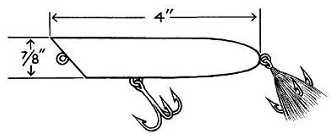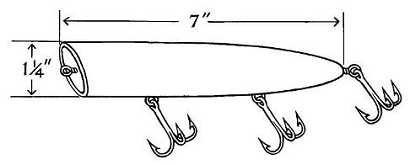|
Saltwater Fishing PlugsStop Wasting Money On Useless
|
The use of cedar is especially important when making surface plugs. But cedar may be too light for the larger-sized saltwater plugs, unless loaded with lead.
Hence, many surf anglers who use big plugs make them from heavier woods such as birch, fir, maple, and walnut. Even such hard woods as ash, oak, and hickory have been used when a heavy saltwater fishing plug is required.
However, these woods are tough to cut, drill, or shape with hand tools, and they do not support too many hardware parts without sinking. In fact, when making any saltwater surface plugs it is necessary to check carefully to make certain that the wood body will support the metal plates, screw eyes, hooks, and other hardware without sinking.
All surface plugs for saltwater fishing should float for best results. I find it's a good idea to assemble all the metal parts which will go on a certain plug and strap them on the wood body with a rubber band.
Then place the wooden plug body in a pail or bathtub filled with water. If it doesn't sink or submerge too much, you are safe in using all that metal on the plug. Otherwise, you have to make a larger wooden body or use lighter screws, screw-eyes, metal plates, or hooks.
Large surface plugs are mostly used for surf fishing or casting, or trolling for big fish with fairly heavy tackle. If you want to make up smaller saltwater surface plugs to use with light spinning or casting tackle just make a smaller version of.

For example, if you want a small surface popper of the type shown above, make it the same way as the large popper for surf fishing shown below but smaller and lighter.
It could have a body 4 in. long with a diameter of 7/8 in. Instead of using three treble hooks, you need only two and these can be smaller. Size 1/0 or 2/0 hooks are best, but make sure they are of heavy wire and strong.
Another effective surface popper can be made by using the same size plug body as the wobbler plug for freshwater fishing . However, instead of using it as shown over there, turn the body around.
Now, instead of diving or wobbling, it becomes a small surface popper which throws a big splash when jerked. It also can use two treble hooks in sizes 1/0 or 2/0.
You can use the surface popper plugs as they are, or you can tie some white or yellow bucktail hair around the treble hook at the tail. Do not put on too much hair, especially on the smaller and lighter plugs, or you won't get as much distance on the cast.
Other surface saltwater fishing plugs include the:
Saltwater anglers have also found the darter type plugs very effective for many fish. You can make a small one to use with light spinning or casting tackle in the same size as the freshwater darter plugs . But for the saltwater model, you should use longer and stronger screw eyes with heavy wire hooks.
Furthermore, similar to the underwater plug for freshwater fishing, we also have the underwater plug for saltwater fishing .
Similarly, saltwater fishing plugs can be painted or sprayed in the same way as the freshwater fishing plugs.
Choose any color combinations you like, but for surf fishing you'll find the "blue mullet" finish one of the best. To get this finish, the plug is first painted white, then a blue back is added blending into the white along the sides.
Another popular saltwater color combination is blue and silver, the blue on the back and the silver along the sides. A silver scale finish can also be sprayed. Or it can be a solid silver finish.
When making your saltwater fishing plugs it is very important to use the best quality and strongest saltwater treble hooks you can obtain.
Strong hooks are the only ones which will stand up any length of time in salt water. Light wire hooks are easily straightened out by big fish, and rust weakens them in a short time.
The basic saltwater fishing plugs described above will take care of most fishing needs. But don't let that stop you from experimenting with different shapes, sizes, or weights.
Although it is easier to duplicate existing models of plugs, more satisfaction is obtained if you design your own. And there is always the chance that it will turn out to be a better fish-getter than existing plugs on the market.
|
| Freshwater Fishing | Bass Fishing | Saltwater Fishing | | Fishing Spoons | Fishing Spinners | Fishing Jigs | | Sinkers | Making Fishing Leaders | Hand Tools | | Link To Us | Contact Us | Preferred Partners | About This Site | | Site Map | |
| Back to Top |
Make-Your-Own-Fishing-Lures.com
© 2004 Make-Your-Own-Fishing-Lures.com. All Rights Reserved.




